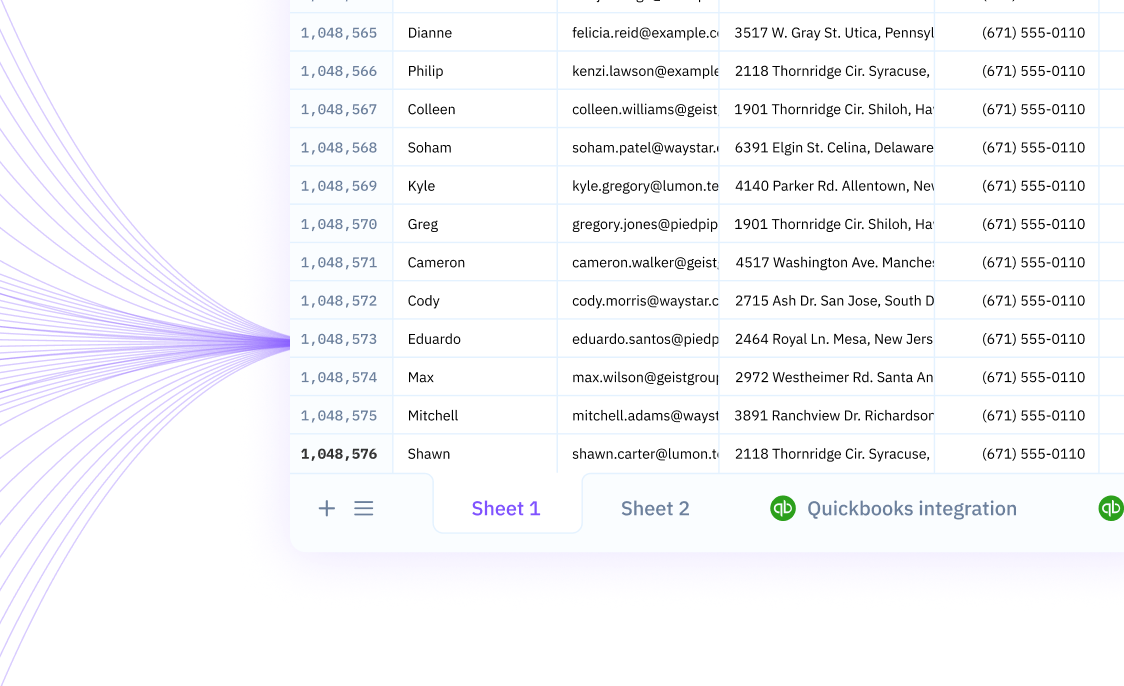
Export Npm to CSV

Overview
In the fast-paced world of software development, the ability to organize and analyze data is crucial. Exporting npm packages to a CSV file is a valuable asset, as it simplifies data management and enhances productivity. By converting npm data into a CSV format, developers can easily load it into spreadsheets for further analysis, tracking, and reporting. On this informative page, we'll delve into the intricacies of npm, guide you through the process of exporting npm to a CSV file, explore various use cases for such exports, introduce an alternative method using Sourcetable, and provide a Q&A section to address common inquiries about exporting npm to CSV. Whether you're a seasoned developer or just starting out, you'll find the resources you need to streamline your data handling with npm and CSV.
What is npm?
npm is the company behind the npm Registry and npm CLI, providing essential services and tools for JavaScript development. The npm Registry, a pivotal element in code sharing within the JavaScript community, comprises over two million packages. Alongside the npm Registry, the npm CLI is made available to the community at no cost, further contributing to npm's commitment to making JavaScript development elegant, productive, and safe.
npm is not only the custodian of these open-source offerings but is also engaged in creating and selling valuable tools for developers. With a user base of more than 17 million developers worldwide, npm plays a crucial role in the developer ecosystem by maintaining the npm Registry—the center of JavaScript code sharing—and ensuring that the services remain reliable and accessible for efficient software development.
Exporting npm Data to a CSV File
Using the 'export-to-csv' Library
The 'export-to-csv' library is a lightweight, zero-dependency package that facilitates the generation and downloading of CSV files in TypeScript and JavaScript environments. Despite not being fully CSV-compliant or consistently maintained, it remains an easy-to-use and stable solution for basic CSV export requirements. It is particularly suitable for projects that require a simple, single-purpose library for CSV generation.
Understanding the Package Characteristics
Prior to implementing the 'export-to-csv' package, it is important to note that it was last published 2 months ago and exhibits a significant update gap of 7 years, indicating infrequent maintenance. Although the package is typescript inspired and is small in size, it does not fully adhere to CSV standards. This should be taken into consideration when dealing with strict CSV formatting needs.
Exporting Data with 'export-to-csv'
To perform a CSV export using the 'export-to-csv' package, first install the library via npm. As it has zero dependencies and is lightweight, the installation process should be swift and simple. Once installed, you can utilize the library's functions to generate CSV strings and trigger downloads directly from your application. The library's straightforward API makes it accessible, even for those with minimal programming experience.
Streamline Your Data Management with Sourcetable
Sourcetable offers a revolutionary approach to handling npm package data by allowing you to directly import your npm datasets into a dynamic spreadsheet environment. This method eliminates the cumbersome process of exporting your data to a CSV file and then importing it into another spreadsheet program. By integrating with Sourcetable, you can synchronize your live npm data effortlessly, ensuring that you always work with the most current information.
Utilizing Sourcetable's advanced capabilities, users can automatically pull in data from multiple sources, including npm, and seamlessly query data using a familiar spreadsheet interface. This provides a significant advantage for automation and business intelligence tasks, as it simplifies the workflow and enhances productivity. Sourcetable's ability to provide real-time data syncing offers a more efficient and error-resistant alternative to traditional CSV exports and imports, making it an invaluable tool for developers and data analysts alike.
Common Use Cases
-
Generating and downloading user data reports in a web applicationN
-
Exporting server-side data to CSV format in a Node.js applicationN
-
Creating downloadable CSV files with custom headers and string quoting for data analysisN
-
Adding a byte order mark to CSV files for compatibility with certain text editorsN
-
Dynamically creating and exporting data with titles for presentation purposesN
Frequently Asked Questions
What is the export-to-csv package?
The package called export-to-csv is a small, published library with zero dependencies that facilitates the generation and downloading of CSV files. It is written in TypeScript and can be used in both JavaScript and TypeScript environments.
Is the export-to-csv package fully CSV compliant?
No, the export-to-csv package is not fully CSV compliant.
Can export-to-csv be used for JavaScript projects?
Yes, export-to-csv can be used in JavaScript projects.
How actively is the export-to-csv package maintained?
The export-to-csv package is not actively maintained.
Are there alternatives to the export-to-csv package?
Yes, alternatives include csv.js and papaparse, which are more fully featured than export-to-csv.
Conclusion
The export-to-csv package is an essential tool for developers who require a lightweight and straightforward solution for CSV generation and download tasks. With zero dependencies and compatibility with both browser and node environments, this TypeScript-designed library simplifies the process of creating CSV files that can be downloaded with either a .csv or .txt extension, in text/csv or text/plain formats. Although it's not fully CSV-compliant and is recommended mainly for basic CSV generation, it serves well for simple needs. If you're looking for an even more efficient approach to handling data, consider using Sourcetable to import data directly into a spreadsheet, eliminating the need for manual exports. Sign up for Sourcetable today to get started and streamline your data management.


